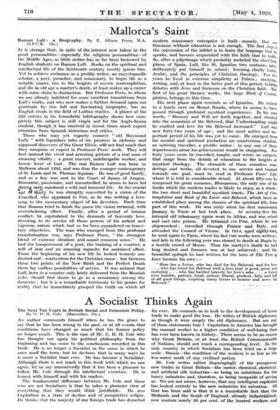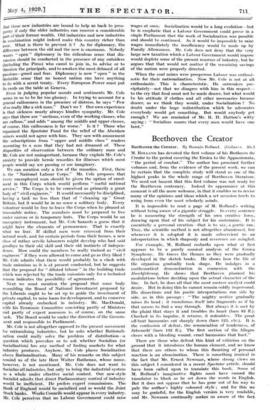A Socialist Thinks Again
The Next Ten Years in British Social and Economic Policy. By -G. D. H. Cole. (Macmillan. 15s.).
AN author commends himself when he has the grace to say that he has been wrong in the past, or at, all events that conditions have changed so much that his former policy no longer avails. This is the case of Mr. G. D. H. Cole who has thought out again his political philosophy from the beginning and has come to the conclusions recorded in this book. He is no longer a Socialist in the sense in which he once used the term, but he declares that in many ways he is more a Socialist than ever. He has become a Socializer. Although there is not much in this book with which we can agree, let us say unreservedly that it has been a pleasure to follow Mr. Cole through his intellectual exercises. He is honest with himself and with his readers.
The fundamental difference between Mr. COle and those who are not Socializers is that he takes a glosnnier view of everything that they would think justifiable. He Sees Capitalisni in a state of decline and of prospective
Ile thinks that the majesty of our foreign trade has departed for ever. He counsels us to look to the development of home trade to make good the loss. He writes of British diplomacy as though it were simply the old diplomacy. But are any of these statements true ? Capitalism in America has brought the manual worker to a higher condition of well-being than has ever been known in history. There seems to be no reason why Great Britain, or at least the British Commonwealth of Nations, should not reach a corresponding level. In the only country in which Socialism has been tried on a large scale—Russia—the condition of the workers is as low as the low-water mark of any civilized nation. Mr. Cole writes rather disparagingly of the prosperous new trades in Great Britain—the motor, chemical, electrical, and artificial silk industries—as being no substitute for the heavy industries and, therefore, as being incapable of saving us. We are not aware, however, that any intelligent capitalist has looked entirely to the new industries for salvation. All that has been said is that it is a remarkable fact that the Midlands and the South of England, already industrialized, now contain nearly 50 per cent. of the insured workers and that these new industries are bound to help us back to pros- perity if only the older industries can recover -a considerable part of their former wealth. Old industries and new industries in combination might indeed make this country richer than ever. What is there to prevent it ? As for diplomacy, the difference between the old and the new is enormous. Nobody wants " open ' diplomacy in the ridiculous sense that dis- cussion should be conducted in the presence of any outsiders linciuding the Tress) who cared to join in, to advise or to threaten the principals, and to awaken the most debased of all passions—greed and fear. Diplomacy is now " open " in the 'desirable sense that no- honest nation can hive anything 'to:do with a secret treaty: Every European Power must put its cards on the table at Geneva.
Even in judging popular moods and sentiments Mr. Cole seems to us to be far too gloomy. In trying to account for a general callousness in the presence of distress, he says " Few of us really like a sick man." Don't we ? Our own experience is that sickness nearly always kindles sympathy. Mr. Cole says that there are " sections, even of the working classes, who are callous," and adds " among the middle and upper classes, of course, this callousness is far Worse." Is it ? Those who organized the Spectator Fund for the relief of the Aberdare miners would hot agree with him. They saw with amazement the subscriptions from " upper and' middle class " readers mounting to a sum that they had not dreamed of. These disparities of observation between the ordinary man and Mr. Cole are not unimportant, because they explain Mr. Cole's anxiety to provide heroic remedies for illnesses which most people would say are passing or are imaginary.
We can mention only a-few of the remedies. First, there is the National Labour Corps." Mr. Cole proposes that 'every unemployed man should be given the option of enrol- ment in this CorpS which would perform " useful national service." The Corps is to be conceived as primarily a great body of " civil engineers" It would necessarily be disciplined, having a task no- less than that of "cleaning up " Great Britain, but it would be in no sense a military body. Every volunteer would be free to leave the Corps when he pleased at reasonable' notice. The members must be' prepared to live under canvas or in temporary huts. The Corps would be an 'emergency instrument, but Mr. Cole hazards a guess that it might have the elements of permanence. That is exactly what we feat: if skilled men were removed from their natural work; and for certain periods from their homes, is new class of rather servile" labourerS might develop who had said goodbye to their old skill and their old instincts of indepen- dence. HoW could the' membersbe really trained as " civil engineers " if they were allowed to come and go as they liked ? Mr. Cole admits that there would probably be a clash with trade unionism as it is at present conducted, but he suggests that the proposal for " diluted labour " in the building trade which was rejected by the trade unionists only for a technical reason indicates the possibility of agreement.
Next we must mention the proposal that some body resembling the Board of National Investment proposed by the Liberals ought to be set up to guide the investment of private capital, to raise loans for development, and to conserve capital already embarked in industry. Mr. MacDonald, with his F.,conomic Committee consisting partly of Ministers arid partly. of expert assessors is, of course, on the same tack. The Board would be under the direction of the Govern- aient and responsible to Parliament.
Mr. Cole is not altogether opposed to the 'present movement rot rationalizing induStries, but he asks whether Rationali- zation could really solVe the problem of distribution—a question which provokes us to ask whether Socialism (or Socialization) has any method of finding markets for what industry produces. Anyhow, Mr. Cole places Socialization above Rationalization. Many of his remarks on this subject remind us of the late Herr _Walter Rathenau, whose name, howeVer, is not mentioned. Mr. Cole does not want to Scelitiiie all industfies, but only to bring the industrial system as a whole under -effective social control. Our new-style Socialist adMits that direct Parliamentary control of industry would be inefficient.: He prefers expert.commissions. The Bank of England would be socialized and so would the Joint Stock banks. Works Councils would appear in every industry. Mr. Cole perceives that no Labour Government could raise wages-at once. Socialization would be a long evolution—but he is emphatic that a Labour Government could prove in a single Parliament that the work of Socialization was possible and should be continued. As it would be impossible to raise wages immediately the insufficiency would be made up by Family Allowances. Mr. Cole does not deny that the very large new taxation which a Labour Government would impose would deplete some of the present reserves of industry, but he argues that that would not matter if the remaining savings of the nation were properly directed.
When the coal mines were prosperous Labour was enthusi- astic for their nationalization. Now Mr. Cole is not at all enthusiastic. This is characteristic. He surrenders pre- cipitately—not that we disagree with him in this respect— to the cry that food must not be made dearer, but what would be his attitude if clothes and all other necessaries became dearer, as we think they would, under Socialization ? No doubt under the huge redistribution which he advocates everybody would get something. But would anybody get enough ? We are reminded of Mr. R. H. Hutton's witty saying : " Socialism means that every man would have one boot."























































 Previous page
Previous page